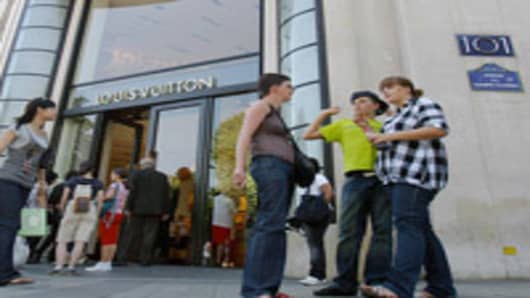Which brands make the rich happy?
A new study from the Affluence Collaborative, a research project formed by several marketing groups, attempted to answer that question, and found that the top brands on that list are all technology names.
That may help to explain why sales of iPhones and other gadgets were so resilient throughout the Great Recession. After the top 10 percent of all Americans control about 70 percent of the wealth, and an even greater percentage of discretionary spending power.
The brands that top the list are Apple, Microsoft,Best Buy , and Sony.
Some of those brands were also preceived as the most innovative. Apple was thought to be the most innovative, followed by Microsoft and Sony , then automakers BMW and Mercedes.
What's more, about 81 percent of the total sample reported that the recent acceleration in technology has also added to their level of enjoyment and happiness.
Even though sales of Louis Vuitton held up well throughout the recession, it was the brand most often called "boring" by the wealthy individuals who answered the Affluence Collaborative's survey.
In fact four of the five brands considered "most boring" were fashion names: Juicy Couture, Prada and Saks Fifth Avenue .
Coffee giantStarbucks rounded out the list of the top five most boring brands. But about 20 percent of those surveyed also said Starbucks makes them happy.
This response also seems to be keeping with the new attitudes that have emerged post recession.
According to those in the survey, many wealthy consumers still don't want their purchases to appear excessive, with many respondents saying that they are finding new satisfication in saving.
This makes this research yet another piece of evidence reinforcing the view that consumers are holding on to the thrifty habits they developed in the depths of the economic crisis.
Earlier this week, Principal Financial's Well-Being Index painted a picture of a consumer who was to emphasis savings, paying off consumer debt, and keeping spending in check.
In that study, three out of five—some 61 percent of workers, and 55 percent of retirees—said they have reduced their spending in the past two months due to the economy. Of those, the majority said they plan to continue to spend less in the future regardless of economic conditions.
But wealthier consumers may be in a better place. Research conducted by Consumer Edge Research this month showed a growing divide between the attitudes of lower- and middle-income consumers and their wealthier counterparts.
According to Consumer Edge, wealthier households are more optimistic than other income groups, which have shown a deteriorating outlook for business conditions and jobs in the lastest month. And this is showing up in their spending patterns. More affluent households are thinking about buying cars, computers, televisions and other electronic items. However, at the same time, more reported using coupons, looking for cheaper brands, and sticking to a budget.
It will be interesting to see if this pattern is reflected in next Tuesday's consumer confidence index. Earlier Friday, consumer sentiment, as tracked by the Thomson Reuters/University of Michigan survey, rose to its highest level since January 2008.
Questions? Comments? Email us at consumernation@cnbc.com



